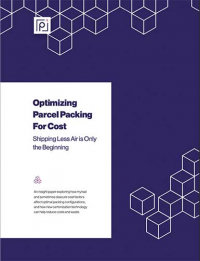Lift trucks: Toyota’s focus on services
Latest Material Handling News
Two voices of reason on pallet materials 60 Seconds with Bob Trebilcock, outgoing executive editor, Modern Materials Handling The reBound Podcast: How Pitney-Bowes is innovating with autonomous vehicles. Packaging Corner: Be open to change 60 Seconds with Robert Martichenko of American Logistics Aid Network More BlogsIf you have a moment, Brett Wood would like to sell you a materials handling solution.
If you know Wood, who is president of Toyota Material Handling, U.S.A., that may sound a little surprising. Toyota, after all, is the number one provider of lift trucks in the world. You don’t think of them as materials handling or supply chain consultants.
And to be fair, TMHU would clearly still like to sell you a lift truck or two. I was Toyota’s guest in Columbus, Indiana, earlier this week, along with my peers in the supply chain media business, to see Toyota’s new line of 8-Series 4 wheel AC electric lift trucks. It was an impressive event. Toyota spent about 7 years after the 2001 launch of the 7-Series 4 wheel electric truck surveying and researching the market before starting up the design and testing phases for the 8-Series in 2008. The new truck includes features to meet the evolving needs of lift truck users, like a new 5,500 pound model, AC-powered hydraulics and travel speeds that are up to 21% faster than previous models. Toyota believes it is the most powerful AC truck they have ever made.
Toyota is also serious about maintaining its leadership position. During the guided plant tour, we saw several areas where new manufacturing equipment was being installed. Toyota, our guide said, was using the economic downturn as an opportunity to increase capacity so it could take market share as things get better. “In tough times, we focus on kaizen activities, training and bringing more production capabilities inhouse,” he told us more than once. Like I said, Toyota still wants to sell trucks.
But later, I asked Wood where he saw TMHU’s opportunity for growth five or ten years from now. Lift trucks were part of the answer, but not the whole answer. “Fork lifts touch everything,” he said, “so we see a lot of our growth coming from an improved economy. When we see a new building going up, regardless of the industry, they’re probably going to need new forklifts. For example, when a new automotive plant goes up, that’s an opportunity for new forklifts.” Toyota hopes to sell more of them than the next guy. Or gal.
At the same time, Wood says Toyota is shifting from just being a lift truck company. TMHU also sells scissors lifts and boom lifts, tow tractors and, now, AGVs. “Fork-free factories,” he said. “We embrace it.”
More importantly, Wood is looking at the services his customers might need, including some that don’t involve lift trucks. Do you need a fleet management solution or a maintenance agreement, a battery management program, a fast charging system, training for your maintenance staff and your operators? Toyota would like to be able to provide you with a solution. Beyond that, Toyota wants to put its engineering and manufacturing expertise to work helping customers improve their processes. “Yes we will still be able to sell you a product,” says Wood. “But we’d also like to come into your plant, look at your operations and provide you with a service or consultative advice about your materials handling operations.”
He added: “I’d be disappointed if five or ten years from now, TMHU was only a lift truck company.”

Article Topics
Blogs News & Resources
Two voices of reason on pallet materials 60 Seconds with Bob Trebilcock, outgoing executive editor, Modern Materials Handling The reBound Podcast: How Pitney-Bowes is innovating with autonomous vehicles. Packaging Corner: Be open to change 60 Seconds with Robert Martichenko of American Logistics Aid Network The reBound Podcast: Looking for talent in all the right places: How Essendant is revolutionizing recruitment The reBound Podcast: Innovation in the 3PL supply chain More BlogsLatest in Materials Handling
Lucas Watson appointed CSO for Körber’s Parcel Logistics business in North America Hyster recognizes Dealers of Distinction for 2023 Carolina Handling names Joe Perkins as COO C-suite Interview with Keith Moore, CEO, AutoScheduler.AI: MODEX was a meeting place for innovation Walmart deploying autonomous lift trucks at four of its high-tech DCs Coles shops big for automation Kathleen Phelps to join FORTNA as chief financial officer More Materials HandlingAbout the Author
Subscribe to Materials Handling Magazine

Find out what the world's most innovative companies are doing to improve productivity in their plants and distribution centers.
Start your FREE subscription today.
April 2024 Modern Materials Handling

Latest Resources










